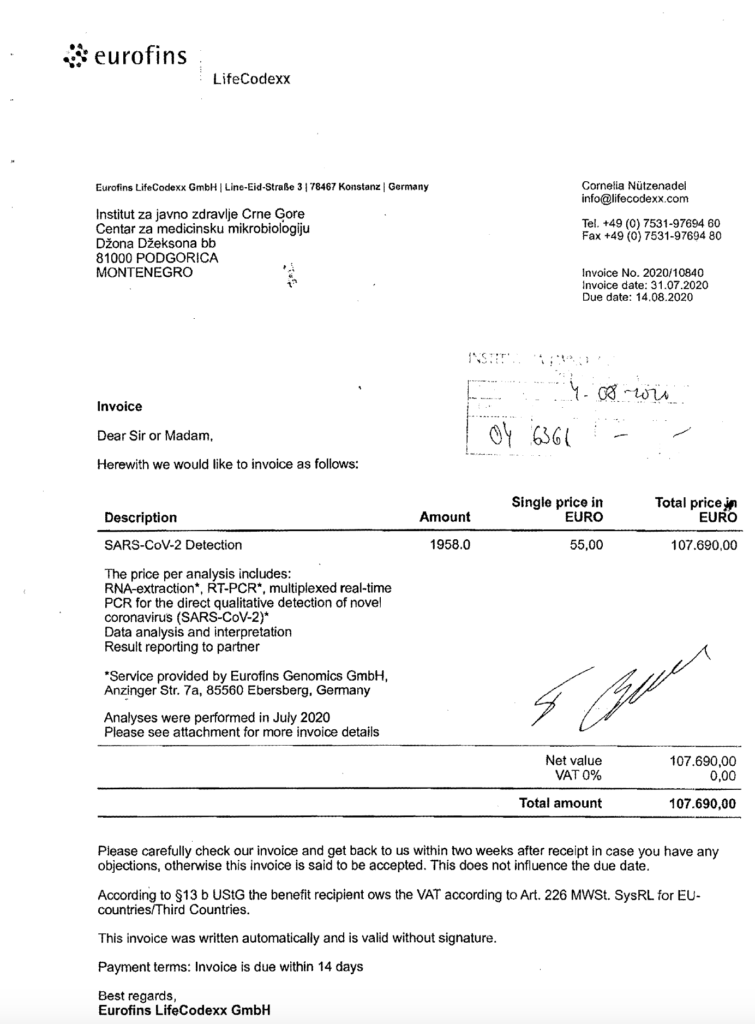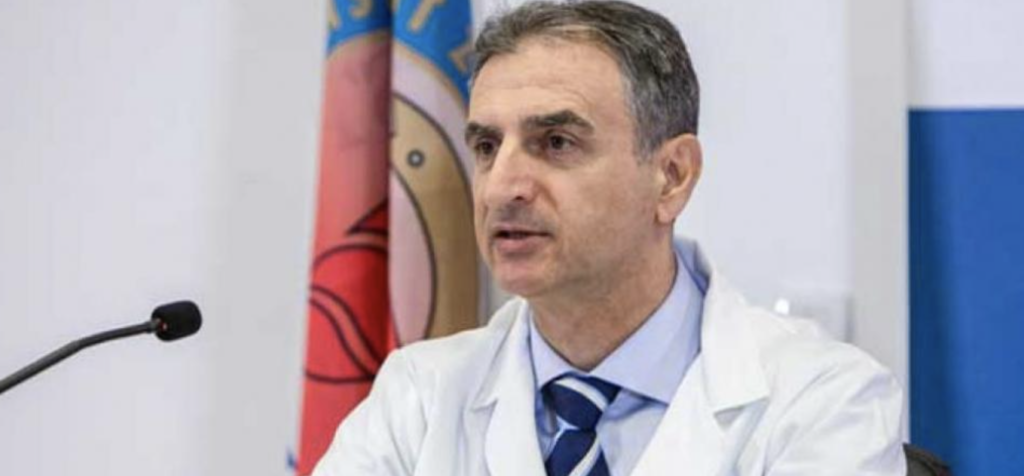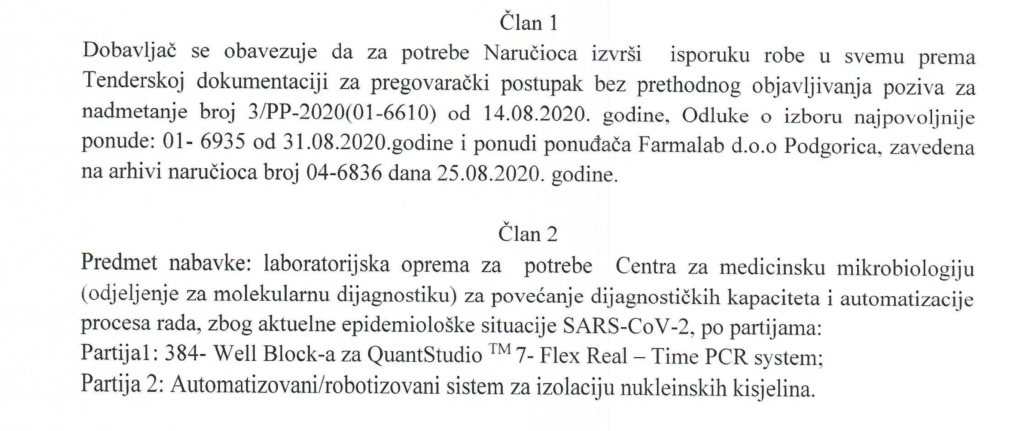Since the beginning of the coronavirus epidemic, the Institute of Public Health (IPH) has spent € 240,000 on testing of samples in a laboratory in Germany, which was enough to procure the necessary equipment to significantly increase the capacity for virus testing in Montenegro and equip at least two more laboratories, according to documentation analysed by the MANS Investigative Centre.
During July, the Institute of Public Health sent the first shipment of 1958 samples to the Eurofins/LifeCodexx laboratory in Ebersburg, Germany, to which around € 107 thousand was paid for testing. Second shipment followed in September, when a contingent of 1,118 samples was sent, which cost the Institute additional € 61.5 thousand.
Finally, third contingent of 1280 samples was sent to Germany this month, for which the Institute expects an invoice of additional € 70 thousand.
The offer of this German laboratory states that the price of an individual test for coronavirus is € 55, which, in addition to the testing itself, also includes data processing and sending a report to the Institute. This price also includes the cost of transporting samples to the Eurfins laboratory in the city of Ebersburg, near Munich.
On the other hand, data show that the Institute of Public Health addressed the Ministry of Health twice in order to increase their capacities for coronavirus testing. A letter was sent for the first time at the beginning of July, when the procurement of equipment that would increase the capacity of the Institute by 20-30% was requested.
After that, the Government approved the procurement of equipment for testing and preparation of samples, worth around € 97 thousand. However, the Institute conducted the tender for this procurement only a month and a half later, while the contract with the company “Farmalab” from Podgorica was signed on September 10.
On that occasion, a PCR device of the Thermo Fisher brand and an automated/robotic system for the preparation of the PCR reaction mixture were procured, which are necessary for the preparation of samples and testing itself.
At the end of September, the Institute asked for help for the second time, requesting additional €350 thousand to expand its capacities. However, according to the Public Procurement Administration, this tender has not yet been announced.
Meanwhile, the Institute, instead of increasing its own capacity, spent € 240,000 on testing of samples abroad.
In a statement for the MANS Investigative Centre, epidemiologist and head of the Trade Union of Montenegrin Physicians, Milena Popović Samardžić, points out that the Government of Montenegro and the National Coordination Body (NCB) had to consider improving the testing infrastructure on time:
“From the very beginning of the pandemic, i.e. epidemic in Montenegro, we have repeatedly warned that something needs to be done about personnel policy, as well as infrastructure and all other capacities in PCR diagnostics at the Institute of Public Health. We have repeatedly suggested that there are eight microbiologists there, that most of the time, the entire PCR diagnostics rests on three people, and since September, on only two highly qualified people, and if we talk about technicians – that number does not exceed 10 people employed in virology department.”
Samardžić points out that they also presented NCB with this problem
“We talked on several occasions, we also had a meeting with Milutin Simović, the Chairman of NCB, where we pointed out to him the importance of procuring new PCR devices. He informed us that there is one PCR device at the Faculty of Agriculture, and potentially at the Faculty of Medicine. In a conversation with the director of the Institute, Boban Mugoša, I emphasized the importance of putting these PCR devices into operation as soon as possible, as well as to technically educate microbiologists and employees at the Institute who are not currently overworked since coronavirus is now the centre of attention, while some of them have almost no work”, Samardžić told MANS Investigative Centre.
When asked to what extent the strategy of the Institute to spend budget funds on testing abroad instead of timely procurement of equipment was cost-effective, Samardžić finds it was an irresponsible and unsustainable decision:
“I wonder if IPH made a cost structure at all, i.e. if they considered the cost-effectiveness of sending tests to Germany. I do not know why they persistently refuse to increase and improve human resources within PCR diagnostics in virology department, while to some extent, precisely that lack of people who can work on so many PCR devices is an excuse not to buy new devices.”
In September this year, the head of virology department, Dr. Zoran Vratnica, left the Institute of Public Health in order to continue his career in his private health institution “Dijagnostika” in partnership with the wife of the director of the Institute, Boban Mugoša.
Samardžić warns of the harmfulness of such practice, and the danger of collapsing of the public health system.
“Dr. Vratnica left the Institute and over 1000 unprocessed samples behind, in order to go to his private laboratory to do the same thing. “Dijagnostika” is the only private laboratory that performs rapid tests approved by the World Health Organization, and that is the information that the director of the Institute had. Those tests are used because of their good specificity, which is similar to PCR, while the result are obtained much faster, and it allows people to orientate themselves more easily and function faster. How did these tests come to Dijagnostika rather than the Institute of Public Health? This fact does not instil confidence in the work of director Mugoša.
Back in February this year, the Institute of Public Health received approval from the Ministry of Health to perform testing abroad, while in the meantime very little has been done to increase the capacity of that institution to a level that can meet all the challenges of the coronavirus epidemic.
Since the beginning of the epidemic, Montenegro has received monetary donations in the amount of over eight million Euros, while currently there is a little over € 5.2 million in the account of NCB. Of the money spent, almost nothing has been invested in the work of the Institute, while the purchase of equipment and testing abroad itself is financed from the budget of Montenegro.
Dejan Milovac
MANS Investigative Centre






